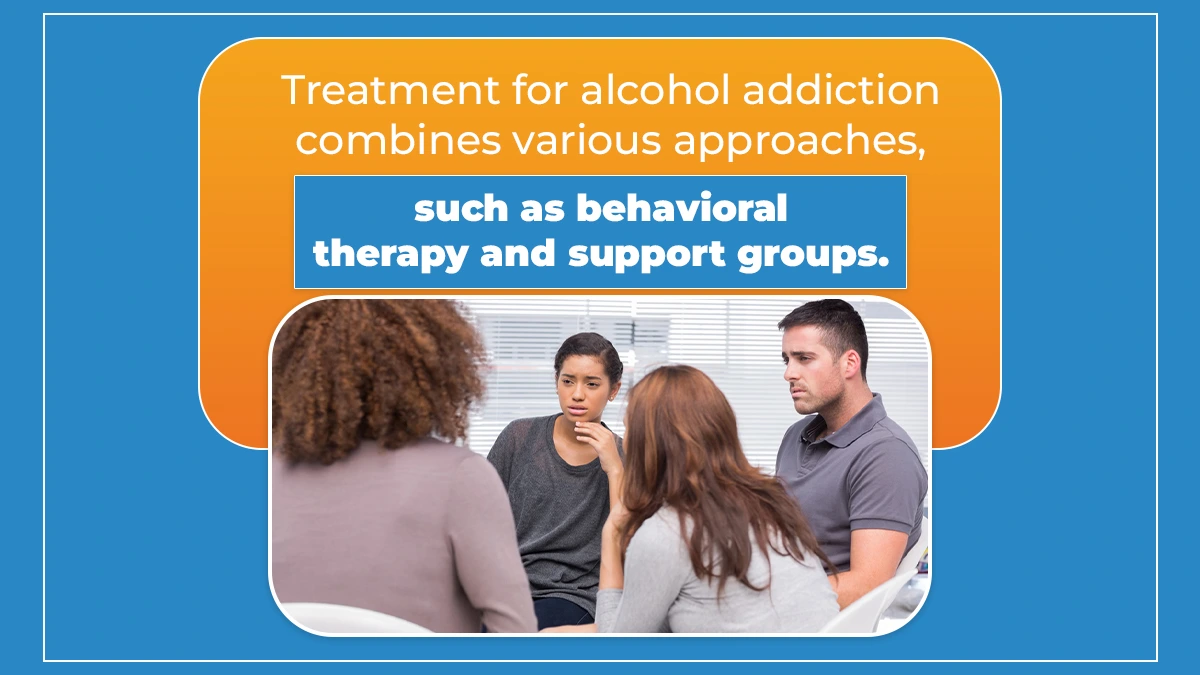
Examples Of Dual Diagnosis
Explore the examples of dual diagnosis and its treatment plans for better outcomes with The Recovery Team-Newton.

Treatment for alcoholism, also known as alcohol use disorder or alcohol dependence, focuses on helping people overcome alcohol addiction and heavy drinking. It includes a variety of addiction treatment programs to address this complex issue.
Overall, addressing alcohol addiction involves a combination of psychological, medical, and social interventions.
Treatment services at The Recovery Team-Newton encompass a multifaceted approach. Depending on the severity of the addiction, inpatient treatment might be recommended, offering 24/7 care and a structured environment for recovery. For patients further along their recovery journey, we offer outpatient treatment. These services are tailored to address the unique needs of each individual, combining therapy, counseling, and support.
Personalized treatment helps patients achieve and maintain sobriety. The goal is to provide a holistic form of treatment that supports physical, emotional, and mental well-being throughout the recovery journey.
Alcoholism has severe physical and mental health consequences, making comprehensive treatment vital. Here’s what you need to know:
The Recovery Team-Newton offers tailored recovery solutions for those struggling with alcoholism. Call us at (508) 978-2772.
Alcoholism, a prevalent issue in the United States, is marked by a spectrum of symptoms and risks. Recognizing these signs is vital for timely intervention and support.
For some, long-term alcohol use may result in brain damage. Among pregnant women, alcohol intake can cause fetal alcohol syndrome in newborns. Victims may also face a higher risk of sexual abuse, which is a grave consequence of impaired judgment and self-destructive behavior.
Understanding when to seek alcoholism treatment is critical. When alcohol consumption starts interfering with daily responsibilities, relationships, or legal matters, it’s time to act.
Frequent blackouts, where the individual cannot remember events due to alcohol use, signal severe alcohol-related issues. Legal troubles, such as DUIs or alcohol-related offenses, are clear indicators that drinking is negatively impacting life.
Seeking medical supervision is the essential first step towards recovery. Healthcare providers and primary care physicians play a vital role in evaluating the extent of alcohol problems. They can provide a professional assessment of the individual’s physical and mental health and recommend a suitable treatment plan.
When a loved one is grappling with a drinking problem, family members play a pivotal role in offering support. Encouraging an open conversation about their alcohol misuse can be a good idea. Professional help from therapists, psychologists, or health professionals is essential in assessing their medical history and mental health.
That can lead to the exploration of different types of treatment. Support groups, including Alcoholics Anonymous, and a wide range of services, such as inpatient rehabilitation centers, can provide the necessary guidance and care. Ultimately, taking the next step toward recovery is vital for the well-being of the individual and their loved ones.
According to the 2021 national survey conducted by the National Institute of Health, a staggering 29.5 million people aged 12 and older, accounting for 10.6 percent of this age group, reported having an alcohol use disorder (AUD) within the past year in the United States.
Understanding the causes of alcoholism is essential for prevention and effective intervention. It’s a complex condition often influenced by a combination of factors.
One perspective on the causes of alcoholism suggests a genetic and biological basis. Some individuals may inherit a predisposition to alcohol use disorders, making them more susceptible.
Specific genes are associated with an increased risk of alcohol dependence. These genes affect how the body metabolizes alcohol and its effects on the brain. Moreover, imbalances in brain chemicals can contribute to addiction by intensifying the pleasurable effects of alcohol.
Psychological and emotional factors play a significant role in alcoholism. Many people turn to alcohol as a coping mechanism for stress, trauma, or emotional pain. Those with low self-esteem may be more prone to using alcohol to boost their confidence or escape reality.
Additionally, individuals with a history of mental illness are at a higher risk of developing alcohol use disorders. The connection between psychological and emotional well-being and alcoholism is profound. Alcohol often becomes a refuge for those dealing with psychological problems.
Environmental and social factors can also be causes of alcoholism. These aspects include peer pressure, the availability of alcohol, and a culture that normalizes heavy drinking, which contributes to alcohol abuse.
Family support and the absence of a support system can influence an individual’s likelihood of developing alcohol-related problems. Moreover, traumatic experiences or stress can lead to alcohol dependence as a means of coping.
Alcoholism is influenced by a range of factors that interact to create a complex condition. Recognizing these factors is essential for effective prevention and intervention. Here are the factors leading to alcoholism:
Behavioral and habitual factors significantly contribute to alcoholism. Over time, frequent alcohol consumption can transition into a deeply ingrained habit, making it challenging to quit.
The progression from casual drinking to dependence often occurs gradually, with individuals increasing progressively their alcohol intake. As alcohol causes changes in brain chemistry, it reinforces the habit, making it increasingly difficult to break.
Social and cultural influences play a substantial role in the development of alcoholism. In some cultures, heavy drinking is not only normalized but even encouraged, significantly increasing the risk of alcohol abuse.
Changing these cultural perceptions surrounding alcohol is a complex task that requires the involvement of social workers and educators. Furthermore, social pressure and peer groups can exert considerable influence, promoting excessive alcohol consumption.
Medical conditions can both contribute to and result from alcoholism. Chronic diseases, such as liver problems and cardiovascular issues, can be directly caused or exacerbated by excessive alcohol consumption.
Conversely, individuals with pre-existing medical conditions may turn to alcohol as a means of self-medication, which often worsens their situation. Recognizing these complex connections is crucial for addressing the intricate interplay between health and alcoholism.
Alcoholism takes a severe toll on physical and mental well-being, often requiring extensive dual diagnosis treatment and family support during the treatment. Here are the effects of alcohol addiction:
Excessive alcohol consumption leads to a wide range of physical health problems, causing immense suffering. Chronic alcohol use can result in:
Alcoholism devastates the body, affecting not only organs but entire bodily systems. This breakdown of the body is preventable with treatment.
Alcoholism doesn’t spare mental health, as it can lead to a host of debilitating psychological problems, including:
Effective rehabilitation and assistance can help mitigate the damage and pave the way for a healthier, more stable future.
Alcoholism is a chronic disease that requires a comprehensive treatment approach. The journey to recovery typically involves several key components to address both the physical and psychological aspects of addiction.
The treatment of alcoholism often begins with a thorough assessment and evaluation. Healthcare providers, such as primary care doctors and therapists, examine the patient’s medical history, physical health, and mental well-being. This process helps determine the severity of alcohol problems and informs the development of an individualized treatment plan.
The level of care varies based on the individual’s needs. The first step usually involves detox under medical care. Some may require inpatient rehab for intensive, 24/7 support.
While others may benefit from an outpatient program that allows them to continue their daily lives while receiving treatment. Healthcare providers make this decision based on the patient’s initial assessment and progress in treatment.
Behavioral therapies, including cognitive-behavioral therapy (CBT) and family therapy, are fundamental in the treatment of alcoholism. CBT helps individuals recognize and change unhealthy thoughts and behaviors related to drinking. Family therapy addresses the impact of addiction on loved ones, promoting healing and communication.
Support groups, such as 12-step programs and mutual-help groups, offer emotional support and a sense of community during the recovery process. These self-help groups provide a platform for individuals to share their experiences and strategies for maintaining sobriety.
The most popular and widely used treatment for alcoholism is behavioral therapy, particularly cognitive-behavioral therapy (CBT). CBT helps individuals identify and modify unhealthy thought patterns and behaviors related to alcohol use. It equips them with valuable coping strategies and problem-solving skills, making it a highly effective approach to the treatment of alcohol addiction.
The first stage in the treatment of alcoholism is often assessment and evaluation. In this stage, healthcare providers include primary care doctors and therapists.
They examine the individual’s medical history, physical health, and mental well-being to determine the severity of alcohol problems. This assessment informs the development of a tailored treatment plan and helps establish the appropriate level of care, whether inpatient or outpatient.
The treatment for alcohol addiction typically involves a combination of approaches. Behavioral therapies, such as cognitive-behavioral therapy (CBT), are essential for addressing the psychological aspects of addiction.
Support groups, including 12-step programs and mutual-help groups, provide emotional support and community. In some cases, a doctor prescribes a combination of medications to reduce cravings and assist in recovery.
If you or a loved one are battling addiction, The Recovery Team-Newton is here to help. We understand the challenges and struggles that come with addiction. Our compassionate team is here to help you every step of the way.
We offer a partial hospitalization program (PHP) to provide structured, intensive care while allowing you to return home in the evenings. Our outpatient program offers flexibility while still providing vital treatment and counseling. We also offer inpatient drug and alcohol rehab for a more intensive, supervised approach to recovery.
Don’t hesitate to reach out to us at (508) 978-2772. We’re here to guide you every step of the way.

Explore the examples of dual diagnosis and its treatment plans for better outcomes with The Recovery Team-Newton.

Explore how long drug rehab programs are with the complete guide from The Recovery Team-Newton.

How much does drug rehab cost without insurance? The Recovery Team-Newton explains financing options and resources.